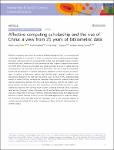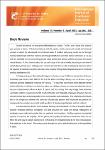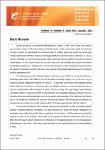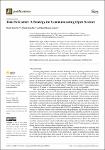Tìm kiếm theo: Tác giả Ho, Manh Tung
Kết quả [1 - 6] / 6
This study adopts the bibliometric approach to identify the key characteristics in the relationship of demographic factors (age, gender, affiliations, and locations), scientific productivity, and the collaboration among development economics researchers in Vietnam during the period 2008–2020. Overall, the number of publications and authors in development economics are rising steeply with the average annual growth rate of nearly 23% and 26%, respectively. Moreover, the ‘quality’ of the research appears to be high as 59% of the articles are published in journals in the first and second quartile according Scimago journal ranking. However, the citation counts for these studies indicate th... |
Affective computing, also known as emotional artificial intelligence (AI), is an emerging and cutting-edge field of AI research. It draws on computer science, engineering, psychology, physiology, and neuroscience to computationally model, track, and classify human emotions and affective states. While the US once dominated the field in terms of research and citation from 1995–2015, China is now emerging as a global contender in research output, claiming second place for the most cited country from 2016–2020. This article maps the rhizomatic growth and development of scientific publications devoted to emotion-sensing AI technologies. It employs a bibliometric analysis that identifies ma... |
Biometric technologies are becoming more pervasive in the workplace, augmenting managerial processes such as hiring, monitoring and terminating employees. Until recently, these devices consisted mainly of GPS tools that track location, software that scrutinizes browser activity and keyboard strokes, and heat/motion sensors that monitor workstation presence. Today, however, a new generation of biometric devices has emerged that can sense, read, monitor and evaluate the affective state of a worker. |
In this book, Andrew McStay introduces the state-of-the-art emotional artificial intelligence (AI) which involves new media technologies that have acquired greater ability to read, sense, track, and classify human emotions, thanks to the rise of big data and computational power. |
In this book, Andrew McStay introduces the state-of-the-art emotional artificial intelligence (AI) which involves new media technologies that have acquired greater ability to read, sense, track, and classify human emotions, thanks to the rise of big data and computational power. |
This paper seeks to introduce a strategy of science communication: Total SciComm or all-out science communication. We proposed that to maximize the outreach and impact, scientists should use different media to communicate different aspects of science, from core ideas to methods. The paper uses an example of a debate surrounding a now-retracted article in the Nature journal, in which open data, preprints, social media, and blogs are being used for a meaningful scientific conversation. The case embodied the central idea of Total SciComm: the scientific community employs every medium to communicate scientific ideas and engages all scientists in the process. |






